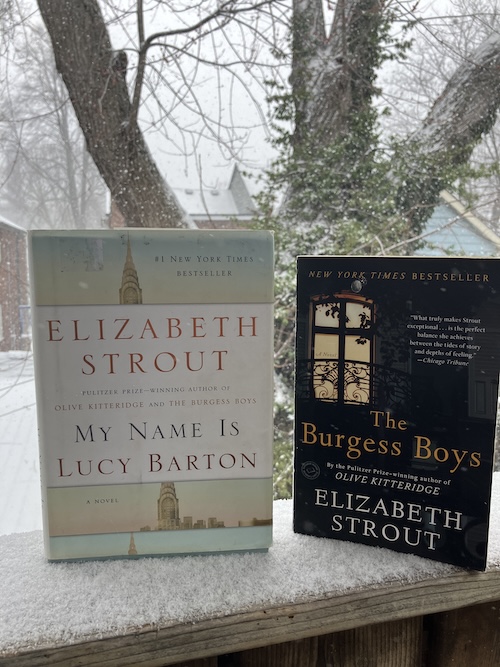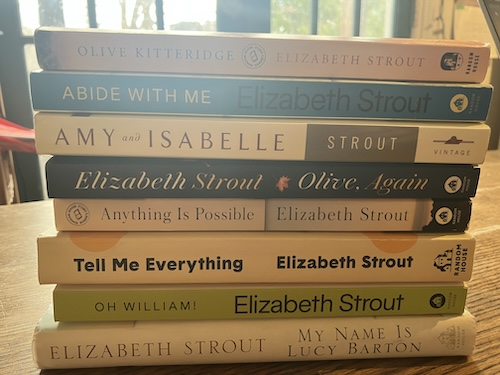May 27, 2025
Olive, Again

The tragic news is that my #WinterofStrout is nearly over, and that OLIVE, AGAIN was the last time I got to read an Elizabeth Strout book for the very first time (until whatever she publishes next), and oh my gosh, I loved it. It’s funny because I think reading Strout’s latest book TELL ME EVERYTHING ruined me a bit for my reread of OLIVE KITTERIDGE, leading to me to expect all kinds of things that this book was never going to deliver. But OLIVE, AGAIN is completely a prequel to TELL ME EVERYTHING, a bridge between Olive’s stories and THE BURGESS BOYS and while Lucy Barton doesn’t appear here, I know that Olive will be meeting her soon (and I loved reading about Olive’s friendship with Isabel, whom I met in TELL ME EVERYTHING, and REALLY got to know on my #WinterofStrout when I finally read Strout’s debut, AMY AND ISABELLE).
I also love that I tripped walking up the stairs while holding this book and a mug of turmeric oat milk latte, splattering the top of the book with yellow, the same yellow bursts that are conspicuous throughout the pages of TELL ME EVERYTHING, forsythia and daffodils and everything.
I love the way that Olive grows in this book, or maybe it’s that both she and we get a little bit closer to knowing who she really is. And what she realizes about who she is, which is so different from who she’d been before, is that she really doesn’t know anything at all. “It seemed to her she had never before completely understood how far apart human experience was… She, who always thought that she knew everything that others did not. It just wasn’t true.” It’s a message that I think is so important right now, as so many otherwise kind and thoughtful people dig themselves deeper and deeper into the holes of their convictions.
And the message too that maybe not knowing everything is…fine? A line from the story “Helped,” “‘I think our job—maybe even our duty—is to…bear the burden of the mystery with as much grace as we can.”
April 2, 2025
#WinterofStrout Update

I was going to talk about how my #WinterofStrout had gone on so long that it was finally spring, but now there’s a blizzard outside, so I guess I don’t have to. (There are now ice pellets blowing against my window.) After Olive Kitteridge, The Burgess Boys was my next Strout reread, which I first read almost exactly two years ago and adored. And having read Tell Me Everything since then, I love it even more now, and it seems less an outlier among Strout’s novels structurally speaking now that I’ve also read Amy and Isabelle and Abide With Me. It’s definitely a companion novel to Tell Me Everything, just without Lucy and Olive, but with the brothers, and a court case, the setting of Shirley Falls, and a consideration of class. And then I reread My Name is Lucy Barton, for the fourth time (I think?), but my first time since seeing the stage play in November, which made the book mean even more to be and made sense of Lucy’s mother’s character in a way I’d never been able to do from reading her on the page. It’s funny how this novel is so short and spare (which is how I’ve been able to reread it so many times) but I still found passages and points I hadn’t paid attention to when I’d been through it before. And now next up is Anything Is Possible, which I’m so excited to read again because it plots the points in Strout’s universe in a way I’d been hoping Olive Kitteridge to do but it didn’t. It will be wonderful to encounter so many characters in this book that I’m relatively familiar with by now.
February 4, 2025
Olive Kitteridge and #WinterofStrout

As I wrote about in my January essay, 2025 is my #WinterofStrout, a project that was born by a comment a friend made in our group chat when we were once again marvelling about Elizabeth Strout’s Lucy Barton books, a proposal to (re)read them all, which I thought seemed like such a fantastic idea, mostly because there are many books by Strout I still had yet to read AND my initial encounters with her books had been such MISreadings. I first read Olive Kitteridge in 2013, and enjoyed it, but had avoided it for years before that thinking it was hokey and middlebrow, and in some ways I wasn’t even wrong, and I certainly wasn’t moved enough by it to pick up Strout’s 2019 follow-up Olive, Again, although that was probably because I’d read another novel by her, My Name is Lucy Barton, in 2016, and been so extraordinarily unmoved (and even desirous of my money back—the book seemed slight, unfinished, not enough).
I also didn’t properly understand how both books could be by the same author, or just who this Elizabeth Strout person was anyway, who invented characters with definitive names that usurped her own in reader consciousness. Not thinking very much about any of it at all, until I went back to Lucy in 2023 and found myself besotted. In some ways, still, My Name is Lucy Barton was not enough, okay (though I could make a good argument against that now, especially having seen it performed as a one woman show), but in connection with Strout’s other works—both those books with Lucy’s voice at the centre and others—there is so much life going on. “Strout’s books are less an exercise in narrative than one of character, and its variable layers, and the connections between them, and between places, ideas, and things.”
I love a reading project, the way these books give shape, structure, and context to my own ordinary experiences. My #WinterofStrout began with her debut novel, Amy & Isabelle, which I read in December and completely enjoyed, impressed by how Elizabeth Strout was Elizabeth Strout right out of the gate, fully formed, and thinking about that line from Lucy Barton about how everyone has just one story, really, and they keep telling it over and over, and that Strout’s for certain is mothers and daughters, mothers and daughters. Although this was less apparent in her second novel, Abide With Me, which read on Christmas Eve, this one a story about a father, a widower, whose troubled daughter would grow up to be Bob Burgess’s friend, social worker friend Katherine Caskey, who shows up in later Strout novels. Abide With Me is a novel about marriage, faith, despair, about the failures of community, about the unknowability of others’ experiences (which perhaps is Strout’s actual one story). About the spots of goodness that save us, the miracle of that in a world where so much is otherwise.
And then it was time for Olive Kitteridge, which I’d really been looking forward to, supposing that re-encountering that book in the broader context of Strout’s work would be fascinating—it won the Pulitzer Prize after all. I was prepared to be dazzled. And reader, I was not. Which is not to say that I didn’t love the book, that I didn’t see all the richness that was there, that I didn’t find the stories in the collection so extraordinarily moving. I did! I did! Everything I love about Strout’s point of view and her fascinations and preoccupations are perfectly on display here, but, I’d had this idea of Strout as an author who “doesn’t write novels so much as chart constellations, connecting points of light, moments of grace.” And really was quite sure that this skill would be on full display in this “novel in stories,” and I’d be able to understand her method better than when I first read the book so many years ago.
But it would turn out that Olive Kitteridge really is, as opposed to a chart of constellations, a short story collection, and not even “a novel in stories,” which Olive does not actually purport to be on my copy, but a collection of stories almost half of which had been published in various places between 1992 and 2007 (and it’s likely I even read that earliest story in its initial publication because it was published in Seventeen, which I was an avid reader at the time). Likely Olive herself was not even present in many of the stories’ original incarnations, the ones in which Olive exists in the background, but added as Strout put the Olive Kitteridge manuscript together, which is fine, but it’s just that I’d been expecting something more organic, something more like the magic of what happens when I meet Isabelle from Amy and Isabelle in the pages of Strout’s latest novel, Tell Me Everything, but again, that’s an awful lot to ask from a book.





